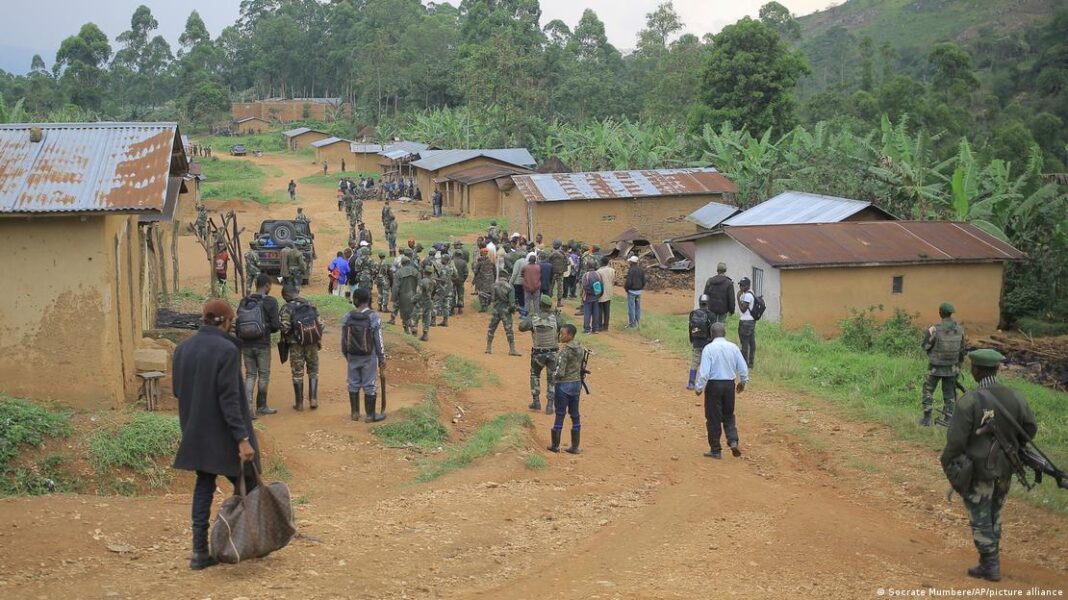At least 20 people were killed in a deadly attack in the east-central African Democratic Republic of the Congo on Friday, said local authorities.
The attack happened on Friday in the village of Musandaba on the outskirts of Beni. Islamic State claimed responsibility for the attack by posting a message on its Telegram channel.
Military and local authorities attribute the attack to the Allied Democratic Forces (ADF), a Ugandan group based in eastern Congo that has pledged allegiance to the Islamic State.
Colonel Charles Omega, the military administrator of the Ben region, said on April 7 that around 20 people were killed in the village of Musandaba. They blamed ADF.
Local activist Janvier Kasereka Kasayirio said 22 bodies were seen in near hospitals.
The attackers used knives to avoid a confrontation with the army, said Anthony Mwalushay, an army spokesman in the North Kivu region. The attack took place in one of the two conflict-torn provinces, where the Congo replaced the military with a civilian administration more than a year ago in a bid to control violence.
This week, the Congo UN peacekeeping mission condemned the ADF massacre in the neighboring Ituri province, which killed 30 people.
The ADF and the Islamic State group
The ADF is an Islamist militia that began as insurgents in neighboring Uganda before moving to the Democratic Republic of Congo in the 1990s. In 2019 the rebels pledged allegiance to the Islamic State group.
The Islamist group has been accused of killing thousands of civilians and is among the most deadly of the numerous rebel militias operation in the region.
Last month, members of the ADF torched the nearby village of Mukondi, killing at least 39 people and wounding many more.
The United States recently offered a reward of up to $5 million (roughly €4.5 million) for information concerning ADF leader Seka Musa Baluku.
Attacks on Civilians by Armed Groups and Government Forces- Human Right Watch
Some 120 armed groups were active in eastern Congo’s Ituri, North Kivu, South Kivu, and Tanganyika provinces, including several groups with fighters from neighboring Rwanda, Uganda and Burundi. Many of their commanders have been implicated in war crimes, including massacres, sexual violence, recruiting children, pillaging, and attacks on schools and hospitals.
Various armed actors, some unidentified, killed at least 2,446 civilians in South Kivu, North Kivu, and Ituri provinces, between January and late October, according to data collected by the Kivu Security Tracker, which documents violence in eastern Congo. This includes at least 155 civilians killed by Congolese security forces.
Congolese and Ugandan joint military operations against the Allied Democratic Forces (ADF), a Ugandan-led armed group with ties to the extremist armed group Islamic State (also known as ISIS), did not stop deadly attacks by the ADF against civilians in North Kivu and Ituri.
In North Kivu, the M23 rebel group attacked the positions of government troops near Goma. Responsible for widespread abuses in 2012 and 2013, including war crimes and crimes against humanity, M23 rebels deliberately killed at least 29 civilians in areas under their control in June and July, and dozens more by the end of the year.
In a confidential report to the UN Security Council that leaked to the media in August, the UN Group of Experts on Congo found “solid evidence” of Rwandan forces providing direct support to M23 fighters. Rwanda denied these accusations.
Countries of the East African Community (EAC), which Congo joined in April, agreed to set up a regional force to fight armed groups in eastern Congo.
In late April and early December, Kenya hosted talks between the Congolese government and several armed groups aimed at securing the surrender and demobilization of fighters. The authorities failed to take several thousand surrendered fighters from various armed groups through its demobilization program, prompting many to return to armed groups.
Tensions remained high in South Kivu’s highlands, with fighting involving several armed groups, some backed by neighboring countries. Burundian troops, which were conducting secret incursions since late 2021, entered South Kivu as the first deployment of the EAC force in August.
In July, violence broke out in Kwamouth in the western province of Mai-Ndombe between ethnic Teke and Yaka communities over land and customary rights. Dozens of people were reportedly killed, and thousands displaced. A high-profile government delegation visited the area in August, and Congolese soldiers were deployed to reinforce security.




